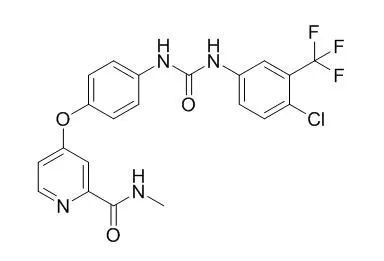| Description: |
Sorafenib is a potent multikinase inhibitor with IC50s of 6 nM, 20 nM, and 22 nM for Raf-1, B-Raf, and VEGFR-3, respectively.Sorafenib together with inhibitors of the β-catenin pathway might be an effective tool in the treatment of pediatric HCC. The combination of Sorafenib with AMPK activators could have beneficial effects on tumor regression by AMPK pathway activation. The combination of metformin or other AMPK activators and Sorafenib could be tested in prospective clinical trials. |
| Targets: |
AMPK | Wnt/β-catenin | mTOR | ERK | VEGFR-3 | B-Raf | Raf-1 |
| In vitro: |
| Biochem Biophys Res Commun. 2015 Apr 3;459(2):234-9. | | MiRNA-30a-mediated autophagy inhibition sensitizes renal cell carcinoma cells to sorafenib.[Pubmed: 25712526] | Chemotherapy-induced autophagy activation often contributes to cancer resistance. MiRNA-30a (miR-30a) is a potent inhibitor of autophagy by downregulating Beclin-1. In this study, we characterized the role of miR-30a in Sorafenib-induced activity in renal cell carcinoma (RCC) cells.
METHODS AND RESULTS:
We found that expression of miR-30a was significantly downregulated in several human RCC tissues and in RCC cell lines. Accordingly, its targeted gene Beclin-1 was upregulated. Sorafenib activated autophagy in RCC cells (786-0 and A489 lines), evidenced by p62 degradation, Beclin-1/autophagy protein 5 (ATG-5) upregulation and light chain (LC)3B-I/-II conversion. Exogenously expressing miR-30a in 786-0 or A489 cells inhibited Beclin-1 expression and enhanced Sorafenib-induced cytotoxicity. In contrast, knockdown of miR-30a by introducing antagomiR-30a increased Beclin-1 expression, and inhibited Sorafenib-induced cytotoxicity against RCC cells. Autophagy inhibitors, including chloroquine, 3-methyaldenine or Bafliomycin A1, enhanced Sorafenib activity, causing substantial cell apoptosis. Meanwhile, knockdown of Beclin-1 or ATG-5 by targeted siRNAs also increased Sorafenib-induced cytotoxicity in above RCC cells.
CONCLUSIONS:
These findings indicate that dysregulation of miR-30a in RCC may interfere with the effectiveness of Sorafenib-mediated apoptosis by an autophagy-dependent pathway, thus representing a novel potential therapeutic target for RCC. |
|
| In vivo: |
| Jpn J Clin Oncol. 2015 Apr;45(4):336-42. | | Cyproheptadine significantly improves the overall and progression-free survival of sorafenib-treated advanced HCC patients.[Pubmed: 25646358] | Sorafenib is a recommended treatment for advanced hepatocellular carcinoma. The study is to evaluate the efficacy of Sorafenib plus cyproheptadine compared with Sorafenib alone in patients with advanced hepatocellular carcinoma.
METHODS AND RESULTS:
A retrospective cohort study reviewed all consecutive advanced hepatocellular carcinoma cases with Child-Pugh Class A disease starting Sorafenib treatment at our hospital from August 2012 to March 2013. They were followed up until 31 December 2013. A total of 52 patients were enrolled: 32 patients in the combination (Sorafenib-cyproheptadine) group and 20 patients in the control (Sorafenib alone) group. The response to treatment, overall survival and progression-free survival were compared.
The median overall survival was 11.0 months (95% confidence interval: 6.8-15.1 months) in the combination group compared with 4.8 months (95% confidence interval: 3.1-6.6 months) in the control group (crude hazard ratio = 0.45, 95% confidence interval: 0.22-0.82). The median progression-free survival time was 7.5 months (95% confidence interval: 5.1-10.0 months) in the combination group compared with 1.7 months (95% confidence interval: 1.4-2.1 months) in the control group (crude hazard ratio = 0.43, 95% confidence interval: 0.22-0.86). Kaplan-Meier survival analysis revealed that both overall survival and progression-free survival in the combination group were significantly longer than that in the control group. The multivariate model found patients in the combination group were 76% less likely to die (adjusted hazard ratio = 0.24, 95% confidence interval: 0.10-0.58) and 82% less likely to have progression (adjusted hazard ratio = 0.18, 95% confidence interval: 0.08-0.44) during the 17 months of follow-up.
CONCLUSIONS:
Cyproheptadine may significantly improve survival outcomes of Sorafenib-treated advanced hepatocellular carcinoma patients. | | Anticancer Res. 2015 Mar;35(3):1803-8. | | Biomarkers of apoptosis and necrosis in patients with hepatocellular carcinoma treated with sorafenib.[Pubmed: 25750346] | Sorafenib is the medical reference for treatment of hepatocellular carcinoma (HCC). Multiple forms of cytotoxicity are induced by Sorafenib in HCC cells in vitro but it is unclear what extent of apoptosis and necrosis is induced in HCC patients receiving Sorafenib.
METHODS AND RESULTS:
The M30 and M65 biomarkers, which reflect the release of cytokeratin-18 and its apoptotic cleavage fragments, were measured in patients with HCC (n=36) and matched patients with cirrhosis (n=47). A serum sample was collected from 20 patients with HCC four weeks after the onset of treatment with Sorafenib.
Basal serum levels of M30 and M65 were increased in patients with HCC compared to those with uncomplicated cirrhosis. No statistically significant increase in the level of M30 or M65 was found in the sera of patients with HCC after Sorafenib.
CONCLUSIONS:
The findings indicate that Sorafenib is not a potent inducer of HCC cell death in most patients. |
|






 Cell. 2018 Jan 11;172(1-2):249-261.e12. doi: 10.1016/j.cell.2017.12.019.IF=36.216(2019)
Cell. 2018 Jan 11;172(1-2):249-261.e12. doi: 10.1016/j.cell.2017.12.019.IF=36.216(2019) Cell Metab. 2020 Mar 3;31(3):534-548.e5. doi: 10.1016/j.cmet.2020.01.002.IF=22.415(2019)
Cell Metab. 2020 Mar 3;31(3):534-548.e5. doi: 10.1016/j.cmet.2020.01.002.IF=22.415(2019) Mol Cell. 2017 Nov 16;68(4):673-685.e6. doi: 10.1016/j.molcel.2017.10.022.IF=14.548(2019)
Mol Cell. 2017 Nov 16;68(4):673-685.e6. doi: 10.1016/j.molcel.2017.10.022.IF=14.548(2019)